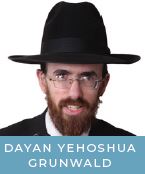Q&A From the Bais HaVaad Halacha Hotline
Knot Allowed
Dayan Yehoshua Grunwald
January 14, 2021
Q Last Shabbos night, while trying to untie my shoes, I mistakenly knotted them (an X over an X). Not knowing whether I was allowed to untie them, I slept in my shoes. Would I have been permitted to undo the knot?

A Among the 39 prohibited melachos of Shabbos are kosheir (tying knots) and matir (untying knots). The Gemara says there are three categories of knots: the Biblically prohibited, the Rabbinically prohibited, and the permitted.
According to the Rambam, a professional knot that was intended to be permanent is Biblically prohibited; a knot meeting only one of those criteria—it’s either professional or permanent—is Rabbinically prohibited; and one meeting neither is permitted. But according to Rashi and the Rosh, intended duration is all that matters: A permanent knot is Biblically prohibited, one meant to last a long but finite time is Rabbinically prohibited, and a knot made for a short time is permitted. The Shulchan Aruch follows the Rambam, but the Rama only permits a knot allowed by both views, i.e., a short-term amateur knot.
The Rishonim discuss the parameters of the “professional” knot. The Rama, citing the Hagahos Alfasi, rules that any double knot should be avoided, as it is possibly professional. And Rishonim disagree whether “short” means under 24 hours or under a week. The Biur Halacha (317:4) rules that one should assume it’s 24 hours, except in cases of great need, where he may go with one week.
In your case, based on the foregoing rules, it would seem to be forbidden to untie a double-knotted shoelace. But the Chochmas Adam writes (see Mishnah Berurah 317:23) that one may untie a double knot that was made unintentionally. The Chazon Ish (O.C. 52:17) explains that the stringency to avoid double knots is only a minhag, and the custom was never adopted in the case of a mistake. Additionally, even if you had knotted it intentionally, because it was intended for less than 24 hours, it may be untied in a case of great physical distress—like disturbed sleep—because it is a question of a Rabbinic prohibition and is in fact permitted according to many Rishonim (see Rama 317:1).